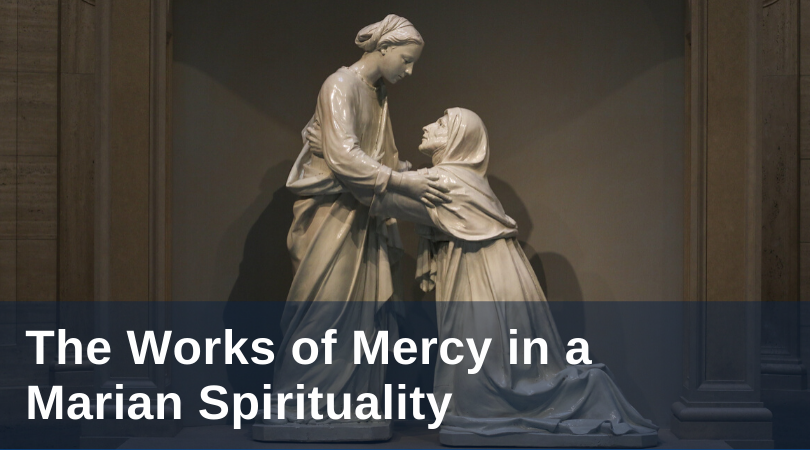
In the Gospel of Luke, we hear that as soon as the angel Gabriel departs from Mary, she travels to the hill country “in haste” to see her cousin Elizabeth (Luke 1:39). When Mary meets her cousin, and the unborn John the Baptist announces the presence of the unborn Lord by leaping in his mother Elizabeth’s womb, Elizabeth proclaims the fruit of Mary’s womb blessed, and Mary herself blessed among women. Mary’s response, the Magnificat, reveals how she has been glorified by God, who has always come to the help of the lowly, the poor, and those who fear him. In this canticle, Mary proclaims the greatness of God because of his mercy.
Just as God graciously bends to the aid of those who are needy, Mary’s own travel reveals her focus on assisting her elderly kinswoman in her first pregnancy. We, too, are called to perform works of mercy, even in this time when we might still be physically separated from others. Like Mary, whose world was surely upended by the Annunciation, but who nevertheless hurried to help Elizabeth, we must also be attentive to those in our midst who need our care and our help. For in living out these works of mercy, we become most like Mary because we bear Christ within us and bring him to others.
Of course, the present circumstances impose certain restrictions on these works of mercy; most of them will need to take place from our own homes. Yet our modern world offers many fruitful ways to reach out to the needy in our communities, to offer both physical and spiritual comfort. Though just a few ideas are shared below, there are many other ways of communicating hope and joy. Now, as never before, it should be obvious that the Christian life is not about accomplishing a set number of tasks, but rather about spreading the Gospel in all times and circumstances.
Visiting the sick or imprisoned
For perhaps the first time, those of us under stay-at-home orders might understand the loneliness of not being able to leave one’s house. For many who were already homebound, this is a daily reality which will not end once quarantine is lifted. For the elderly members of your local community in particular, this may be a time of great uncertainty and perhaps great loneliness. In lieu of a physical visit, consider a phone call or virtual visitation with older parents or friends. For grandparents or residents of a nursing home, consider sending cards or having children draw pictures.
Feeding the hungry
At one level, it is still quite simple to feed the hungry: if you know of members of a community who are hesitant to leave the house, consider offering to pick up groceries and delivering them to their door. Or consider donating to food banks or local organizations committed to feeding students or families who are experiencing food insecurity. Monetary donation is usually easier and the most effective way to help organizations who assist a local community; consider checking your local news outlets’ websites for lists of charitable organizations and suggestions for how you can best help them in this time.
Pray for the living and the dead
Finally, amid the corporal works of mercy we can offer our neighbors, we are also called to imitate Mary’s unceasing trust in God and her self-giving charity on a spiritual level. Just as our bodies can become malnourished without nutritious food or water, our souls can become malnourished without prayer, which nourishes our relationship with God. When we pray for the living and the dead, we are not only offering our prayers for the intentions of our neighbors, family, or strangers. We are entering into our own relationship with God, drawing strength and confidence from prayer. It is this confidence—the trust which comes from knowing that God is ultimately the font of all mercy—which allows us to go out into the world to share these works of mercy. And it is this same confidence which encourages us to continue these practices even in a time of radical separation and uncertainty. For like Mary, we know that God’s mercy is “from age to age” (Luke 2:50).
Like what you read? Submit your email below to have our newest blogs delivered directly to your inbox each week.
Featured image by Fr. Lawrence Lew, OP via flickr; CC-BY-NC-ND-2.0.


